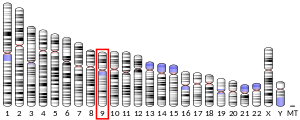MPGES-1
(Redirected from PTGES)
Microsomal prostaglandin E synthase-1 (mPGES-1)[5][6] or Prostaglandin E synthase is an enzyme that in humans is encoded by the PTGES gene.[7][8][9]
The protein encoded by this gene is a glutathione-dependent prostaglandin E synthase. The expression of this gene has been shown to be induced by proinflammatory cytokine interleukin 1 beta (IL1B). Its expression can also be induced by tumor suppressor protein TP53, and may be involved in TP53-induced apoptosis.
Knockout studies in mice suggest that this gene may contribute to the pathogenesis of collagen-induced arthritis and mediate acute pain during inflammatory responses.[9]
See also
References
- ^ a b c GRCh38: Ensembl release 89: ENSG00000148344 – Ensembl, May 2017
- ^ a b c GRCm38: Ensembl release 89: ENSMUSG00000050737 – Ensembl, May 2017
- ^ "Human PubMed Reference:". National Center for Biotechnology Information, U.S. National Library of Medicine.
- ^ "Mouse PubMed Reference:". National Center for Biotechnology Information, U.S. National Library of Medicine.
- ^ Jakobsson PJ, Thorén S, Morgenstern R, et al. (1989). "Identification of human prostaglandin E synthase: a microsomal glutathione-dependent, inducible enzyme, constituting a potential novel drug target". Proc Natl Acad Sci USA. 96 (13): 7220–7225. Bibcode:1999PNAS...96.7220J. doi:10.1073/pnas.96.13.7220. PMC 22058. PMID 10377395.
- ^ Hui-Hua Chang; Emmanuelle J Meuillet (2011). "Identification and development of mPGES-1 inhibitors: where we are at?". Future Med Chem. 3 (15): 1909–1934. doi:10.4155/fmc.11.136. PMC 3232027. PMID 22023034.
- ^ Polyak K, Xia Y, Zweier JL, Kinzler KW, Vogelstein B (Sep 1997). "A model for p53-induced apoptosis". Nature. 389 (6648): 300–5. Bibcode:1997Natur.389..300P. doi:10.1038/38525. PMID 9305847. S2CID 4429638.
- ^ Jakobsson PJ, Morgenstern R, Mancini J, Ford-Hutchinson A, Persson B (May 1999). "Common structural features of MAPEG -- a widespread superfamily of membrane-associated proteins with highly divergent functions in eicosanoid and glutathione metabolism". Protein Sci. 8 (3): 689–92. doi:10.1110/ps.8.3.689. PMC 2144274. PMID 10091672.
- ^ a b "Entrez Gene: PTGES prostaglandin E synthase".
Further reading
- Bastien L, Sawyer N, Grygorczyk R, et al. (1994). "Cloning, functional expression, and characterization of the human prostaglandin E2 receptor EP2 subtype". J. Biol. Chem. 269 (16): 11873–7. doi:10.1016/S0021-9258(17)32654-6. PMID 8163486.
- Wu T, Wu H, Wang J, Wang J (2011). "Expression and cellular localization of cyclooxygenases and prostaglandin E synthases in the hemorrhagic brain". J Neuroinflammation. 8: 22. doi:10.1186/1742-2094-8-22. PMC 3062590. PMID 21385433.
- Funk CD, Furci L, FitzGerald GA, et al. (1994). "Cloning and expression of a cDNA for the human prostaglandin E receptor EP1 subtype". J. Biol. Chem. 268 (35): 26767–72. doi:10.1016/S0021-9258(19)74379-8. PMID 8253813.
- Giacomini E, Giordani L, di Modugno F, et al. (1998). "Increased PGE2 production mediates the in vitro inhibitory effect of the human immunodeficiency virus P24 immunosuppressive heptapeptide Ch7". Scand. J. Immunol. 48 (3): 248–53. doi:10.1046/j.1365-3083.1998.00389.x. PMID 9743208. S2CID 20332912.
- Jakobsson PJ, Thorén S, Morgenstern R, Samuelsson B (1999). "Identification of human prostaglandin E synthase: a microsomal, glutathione-dependent, inducible enzyme, constituting a potential novel drug target". Proc. Natl. Acad. Sci. U.S.A. 96 (13): 7220–5. Bibcode:1999PNAS...96.7220J. doi:10.1073/pnas.96.13.7220. PMC 22058. PMID 10377395.
- Forsberg L, Leeb L, Thorén S, et al. (2000). "Human glutathione dependent prostaglandin E synthase: gene structure and regulation". FEBS Lett. 471 (1): 78–82. doi:10.1016/S0014-5793(00)01367-3. PMID 10760517. S2CID 10901322.
- Han R, Smith TJ (2002). "Cytoplasmic prostaglandin E2 synthase is dominantly expressed in cultured KAT-50 thyrocytes, cells that express constitutive prostaglandin-endoperoxide H synthase-2. Basis for low protaglandin E2 production". J. Biol. Chem. 277 (39): 36897–903. doi:10.1074/jbc.M206949200. PMID 12145315.
- Giannoulias D, Alfaidy N, Holloway AC, et al. (2002). "Expression of prostaglandin I(2) synthase, but not prostaglandin E synthase, changes in myometrium of women at term pregnancy". J. Clin. Endocrinol. Metab. 87 (11): 5274–82. doi:10.1210/jc.2002-020521. PMID 12414902.
- Ouellet M, Falgueyret JP, Ear PH, et al. (2003). "Purification and characterization of recombinant microsomal prostaglandin E synthase-1". Protein Expr. Purif. 26 (3): 489–95. doi:10.1016/S1046-5928(02)00566-1. PMID 12460774.
- Strausberg RL, Feingold EA, Grouse LH, et al. (2003). "Generation and initial analysis of more than 15,000 full-length human and mouse cDNA sequences". Proc. Natl. Acad. Sci. U.S.A. 99 (26): 16899–903. Bibcode:2002PNAS...9916899M. doi:10.1073/pnas.242603899. PMC 139241. PMID 12477932.
- Uracz W, Uracz D, Olszanecki R, Gryglewski RJ (2003). "Interleukin 1beta induces functional prostaglandin E synthase in cultured human umbilical vein endothelial cells". J. Physiol. Pharmacol. 53 (4 Pt 1): 643–54. PMID 12512699.
- Meadows JW, Eis AL, Brockman DE, Myatt L (2003). "Expression and localization of prostaglandin E synthase isoforms in human fetal membranes in term and preterm labor". J. Clin. Endocrinol. Metab. 88 (1): 433–9. doi:10.1210/jc.2002-021061. PMID 12519887.
- Kamei D, Murakami M, Nakatani Y, et al. (2003). "Potential role of microsomal prostaglandin E synthase-1 in tumorigenesis". J. Biol. Chem. 278 (21): 19396–405. doi:10.1074/jbc.M213290200. PMID 12626523.
- Jakobsson PJ, Thorén S, Morgenstern R, Samuelsson B (2003). "Characterization of Microsomal, Glutathione Dependent Prostaglandin e Synthase". Eicosanoids and Other Bioactive Lipids in Cancer, Inflammation, and Radiation Injury, 5. Advances in Experimental Medicine and Biology. Vol. 507. pp. 287–91. doi:10.1007/978-1-4615-0193-0_44. ISBN 978-0-306-47283-1. PMID 12664599.
- Thorén S, Weinander R, Saha S, et al. (2003). "Human microsomal prostaglandin E synthase-1: purification, functional characterization, and projection structure determination". J. Biol. Chem. 278 (25): 22199–209. doi:10.1074/jbc.M303227200. PMID 12672824.
- Alfaidy N, Sun M, Challis JR, Gibb W (2003). "Expression of membrane prostaglandin E synthase in human placenta and fetal membranes and effect of labor". Endocrine. 20 (3): 219–25. doi:10.1385/ENDO:20:3:219. PMID 12721500. S2CID 9590845.
- Ekström L, Lyrenäs L, Jakobsson PJ, et al. (2003). "Basal expression of the human MAPEG members microsomal glutathione transferase 1 and prostaglandin E synthase genes is mediated by Sp1 and Sp3". Biochim. Biophys. Acta. 1627 (2–3): 79–84. doi:10.1016/S0167-4781(03)00077-0. PMID 12818425.
- Murakami M, Nakashima K, Kamei D, et al. (2003). "Cellular prostaglandin E2 production by membrane-bound prostaglandin E synthase-2 via both cyclooxygenases-1 and -2". J. Biol. Chem. 278 (39): 37937–47. doi:10.1074/jbc.M305108200. PMID 12835322.
- Trebino CE, Stock JL, Gibbons CP, et al. (2003). "Impaired inflammatory and pain responses in mice lacking an inducible prostaglandin E synthase". Proc. Natl. Acad. Sci. U.S.A. 100 (15): 9044–9. Bibcode:2003PNAS..100.9044T. doi:10.1073/pnas.1332766100. PMC 166435. PMID 12835414.





